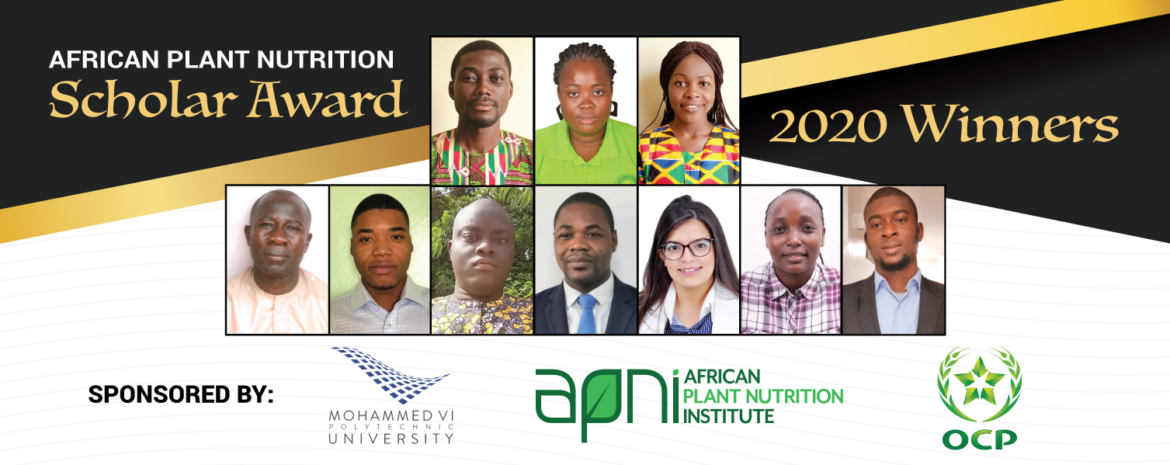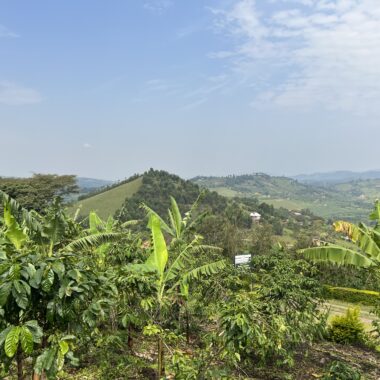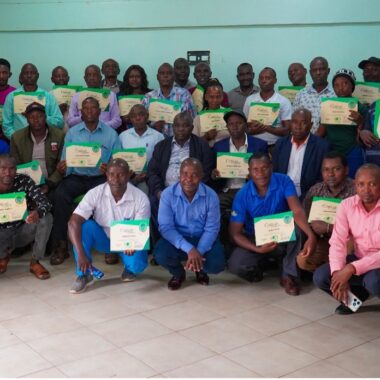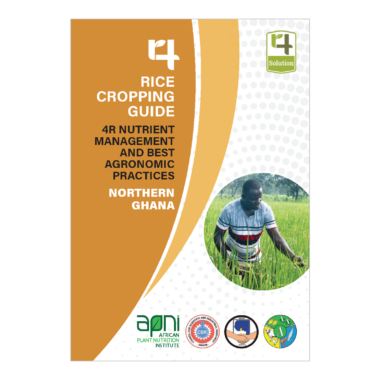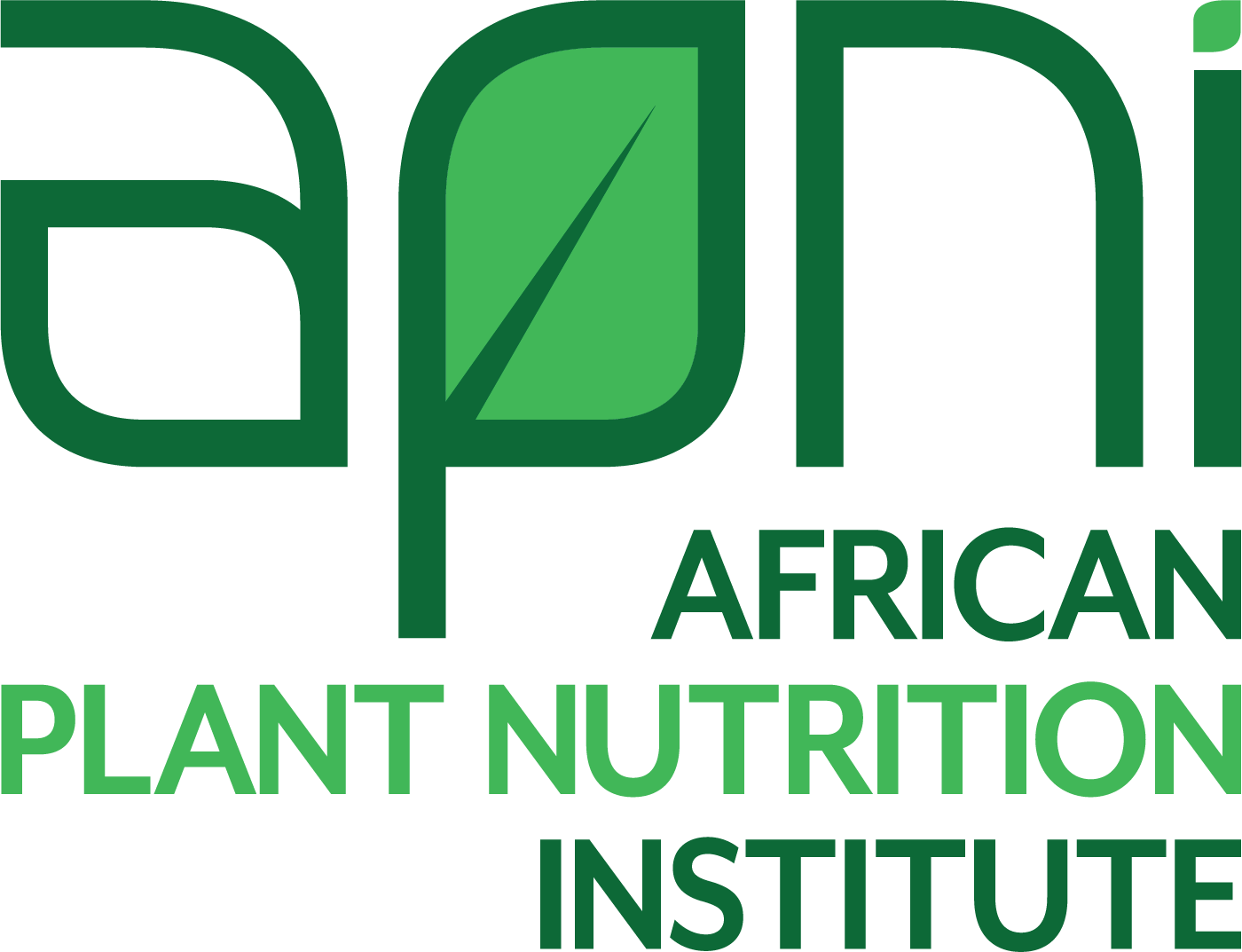
Media Release
www.apni.net/media-center
2020 Recipients of Plant Nutrition Scholar Award Announced
Awards of USD $2,000 have been conferred to these ten African graduate students enrolled in science programs relevant to plant nutrition and management of crop nutrients. The awards are made in recognition of their academic and research efforts, and are sponsored by the African Plant Nutrition Institute (APNI), Mohammed VI Polytechnic University (UM6P), and OCP Group.

Mr. Sulaimon BASIRU — Nigeria
Fertilizer Science and Technology, Mohammed VI Polytechnic University, Morocco.
Mr. Sulaimon BASIRU is a M.Sc student studying Fertilizer Science and Technology at Mohammed VI Polytechnic University in Morocco. He is a native of Nigeria who obtained his B.Sc. in Biochemistry from the University of Ibadan.
His research topic is titled “Can good nitrogen nutrition help alleviate the impact of saline stress in quinoa?” Mr. Basiru explains that soil salinity is a major environmental constraint affecting quinoa yields. Quinoa is a highly nutritious crop, with more protein, vitamins and minerals than most cereals. Quinoa is quite tolerant to abiotic stress such as drought and salt, making it a good choice for growing in semi-arid climates. Nitrogen is a major macronutrient that is often deficient for crops. Recent studies show that nitrogen can mitigate abiotic stress, but its effect in quinoa is unknown. The study will investigate how nitrogen fertilization impacts on quinoa’s resilience to soil salinity. Improve quinoa yields in the presence of limiting environmental factors would contribute to food security. Cultivating quinoa in saline soil may lead to decreased salinity over time improve the soil conditions.
Mr. Basiru’s passion lies in research, teaching and sustainable agriculture. He looks forward to being a researcher, teacher and farmer. “My research interests encompass sustainable nutrient management to mitigate effect of stress on plants. I hope to help eradicate human malnutrition through proper micronutrient fertilization,” explains Basiru. “I am also interested in biofertilizers and neutraceuticals as they relate to crop nutrition.
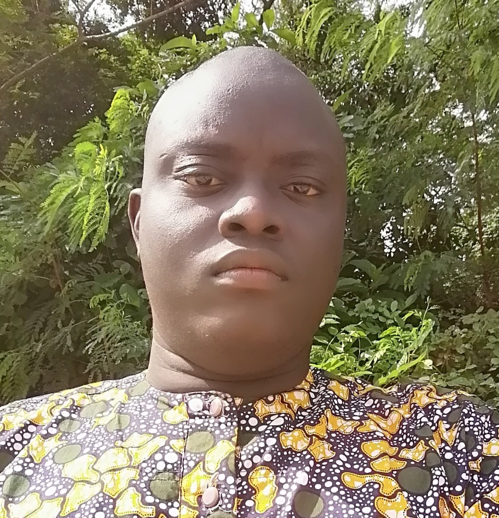
Mr. Faki Oyédékpo CHABI — Benin
Sustainable Management of Soils and Crops (ISCM), Soil Sciences Laboratory, l’Université d'Abomey-Calavi (UAC), Benin
Mr. Faki Oyédékpo Chabi is a Ph.D. student in plant nutrition at the University of Abomey-Calavi (UAC). He is a native of Benin and his research works have been conducted at the Research Unit of Sustainable Soils and Crops Management (ISCM) of the Soil Sciences Laboratory. He obtained his B.Sc. (Vegetable Production) and M.Sc. (Tropical Soil Fertility) from the University of Abomey-Calavi.
My research topic is on “Determination of rates of mineral fertilizers for optimizing the nutrition of peanut and soybean in Benin. The objective is to develop optimal combinations of nitrogen (N), phosphorus (P), potassium (K), magnesium (Mg), and zinc (Zn) for sustainable production and quality of peanut and soybean under different soil types in Benin. This research is a response to the challenge of decline in productivity of peanut and soybean and the lack of a specific fertilizer formula for these crops. The application of macro, secondary, and micro nutrients significantly influenced the yield attributes of peanut and soybean with optimum yields of 2.5 t/ha, corresponding to an increase of 100% compared to current yields in rural areas.
My major personal challenge is to complete my doctoral thesis. Next, I will look for post-doc opportunities to increase knowledge on research aspects related to nutrient fractionation in the soils under legumes (peanuts and soybeans)-based cropping systems as well as the concepts of climate-soil fertility through modeling. I am planning on joining an applied research center in the future.
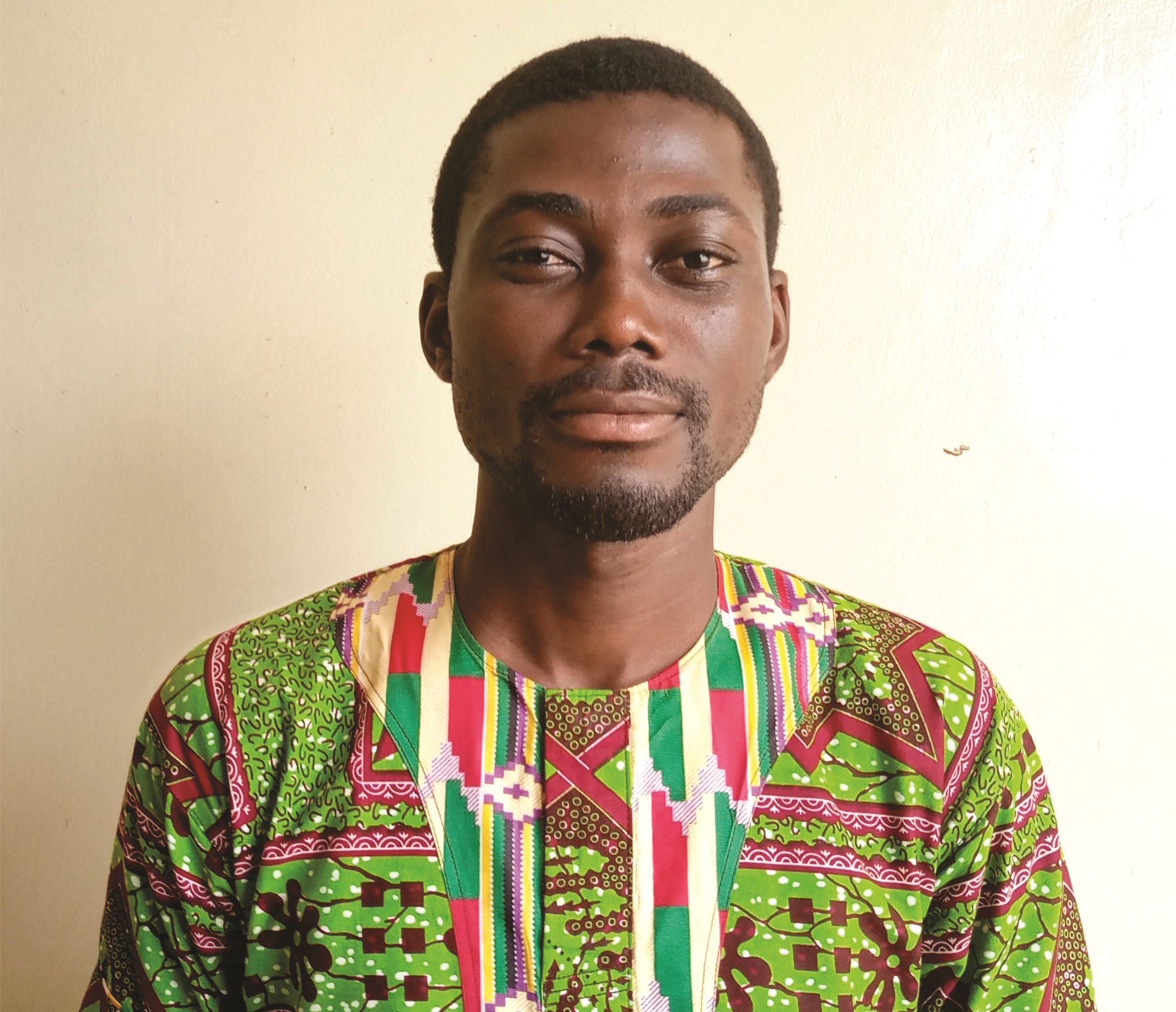
Mr. Richard Kwame Dogbey — Ghana
University for Development Studies, Tamale, Ghana
Mr. Richard Kwame Dogbey is a M.Sc. student at the University for Development Studies in Tamale, Ghana. He is a native of Ghana who obtained his B.Sc. in Agricultural Technology from the University for Development Studies.
The title of his thesis is “Evaluation of the effect of different land gradients on nutrient loss, and crop yield in the Savannah Zone of Ghana.” This study compares the effect of different land gradients on runoff, nutrient loss, and crop performance. He will also quantify nutrient loss and analyze crop performance.
Mr. Dogbey’s has begun constructing runoff experimental plots; determining the soil physicochemical properties prior to planting; estimating the quantity of nitrogen, phosphorus, and potassium loss through runoff; and evaluating the growth and yield of maize.
He hopes to influence decision makers regarding the proper land to cultivate, employing appropriate soil conservation methods based on the landscape; the type of fertilizer to use and adjusting fertilizer application based on erosion losses; and the selection of crops based on canopy cover and nutrient depletion rates. The research goal is to guide better fertilizer management to increase crop productivity.
Mr. Dogbey is interested in agriculture, research, computing and is currently building capacity in geographic information systems (GIS) techniques for proper planning, design and management of agricultural systems. “I aim to pursue a career in academia, explains Mr. Dogbey. “In the next five years, I expect to have a doctorate degree in the field of irrigation and drainage engineering. I want to be an expert consultant in this field and also a lecturer to impart knowledge to the younger generation.”
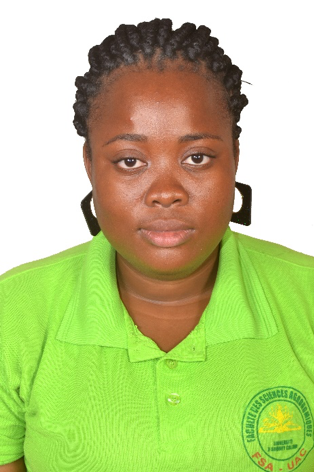
Ms. Layo Yasmine Lynda GODONOU — Benin
School of Plant Sciences, Faculty of Agricultural Sciences, University of Abomey-Calavi, Benin.
Ms. Layo Yasmine Lynda GODONOU is a M.Sc. student in agricultural engineering at the School of Plant Sciences, Faculty of Agricultural Sciences, University of Abomey-Calavi, Benin.
The research focus of her thesis is on “The effect of side shoot pruning and potassium nutrition on the quality, yield, shelf life and economic return of locally produced tomatoes in Benin.” This study aims to assess the effect of side shoot pruning and potassium nutrition on the quality, yield and shelf life of tomato fruit. “Based on functional equilibrium in plants and source-sink strength, I hypothesize that side shoot removal will redirect the photosynthates in the plant. The photosynthates will partition from the side shoots to the fruit, leading to improved fruit quality” explains Godonou. With potassium, it is expected that the strength of the fruit sink will increase, contributing to improved tomato shelf life. The outputs of her research will increased availability of high-quality tomato fruits in Benin. In addition, higher fruit quality will reduce post-harvest losses.
Currently her interests lie in extending shelf life of horticultural crops using pre harvest factors (agronomic practices) based on crop ecophysiology/physiology. Once Ms. Godnonou completes her agricultural engineer degree, she would like to pursue doctoral studies in the field of ecophysiology/physiology and become an international expert in eco-physiology of horticultural crops, as well as post-harvest management of horticultural crops.

Mr. Séwatchè Roméo KPODJI — Senegal
Plant Biology Department of Sciences and Technology, Université Cheikh Anta Diop de Dakar, Dakar, Senegal
Mr. Séwatchè Roméo KPODJI is a M.Sc. student of Agroforestry Ecology and Adaptation at the Plant Biology Department of Sciences and Technology, Université Cheikh Anta Diop de Dakar in Senegal (AFECA/BV/FST/UCAD). His thesis work is studying “The interaction between organic residual products and indigenous microorganisms beneficial to the lability of iron and zinc in soil in Senegal.”
“This subject is part of a project that aims to improve the nutritional quality of food for the Senegalese population” explains Mr Kpodji. “Indeed, it is found that the population suffers from silent hunger caused by a deficiency of iron and zinc in meals.”
This project will show how the organic waste products that are returned to the soil could influence the nutritional quality of food. Organic residuals are mineralized by microorganisms, which influences the phytoavailability of iron and zinc. The solubility of iron and zinc is associated with their uptake by food crops. The main objective of the work is to assess the influence of Beneficial Indigenous Microorganisms (BIM) on the solubility of iron and zinc in a soil in Senegal.
After his master graduation, Mr Kpodji plans to do a Ph.D. centered around the interactions between soils, trees and animals in soil fertility and land degradation in the changing climate of Sub-Saharan Africa.
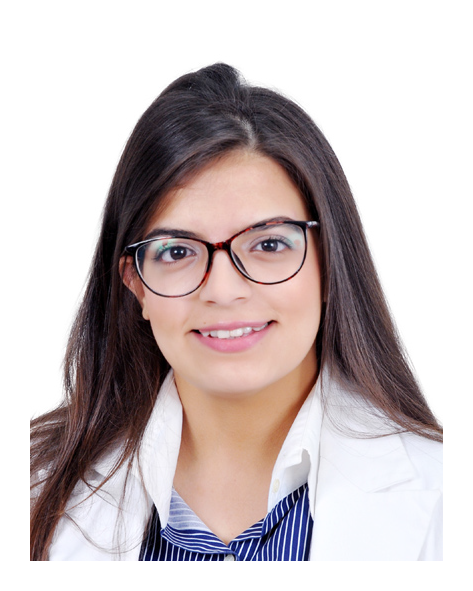
Ms. Salma MOUHIB — Morocco
University Sidi Mohamed Ben Abdellah, Fes, Morocco
Ms. Salma MOUHIB is a biotechnologist recently graduated from University Sidi Mohamed Ben Abdellah, Fes, Morocco.
Her M.Sc. degree in Sciences and Technologies (Microbial Biotechnology) involved a thesis based on a partnership project between MIT, UM6P and OCP on “Advanced seed coating technology controlling the seed microenvironment through biomaterials and bacteria to improve the germination and seedling development of common beans (Phaseolus vulgaris) in drought conditions.”
The project study was aimed at exploring the influence of phosphorus (P) supply on the plant-bacteria interaction. The study focused on: (i) the plant microbiome diversity and functioning under different P supplies to discover the range of adaptations to overcome nutrient limitation and enhance the dynamics of roots; (ii) the plant exudation processes and identification of the repertoire of metabolites acting as signal molecules involved in bacterial genes of chemotaxis and motility; and (iii) uncovering the specific effect of metabolome inducted by P supply.
This would lead to characterize the impact of determined P supply that would be efficient for the microbiome community, promoting the activity of beneficial microorganisms and increasing plant P nutrition.
To undertake this work, a combination of approaches were employed including agronomic, microbiological, metagenomics, metatranscriptomics, and metabolomics.
The exploration of the influence of P supply on the microbiome’s potential is a powerful approach that can substantially increase plant nutrition performance by improving environmental health, eliminating excessive P fertilizer use, and maintaining a soil healthy for a sustainable agriculture.
My current interests are primarily focused on furthering my career of research by reaching a doctoral scholarship in the field of green biotechnology. Being truly passionate about this field, I intend to strive for excellence by drawing inspiration and putting other disciplines at the service of it and exploring new leads of innovation and sustainable development. My longer-term goals are to become a leading scientific researcher with successful end-to-end project management experience under my belt as I grow into a more senior biotechnologist role, with strong focus on hands-on experience and continued learning.

Mr. Atchala N'GBENDEMA — Togo
Ecole supérieure d'agronomie/ université de Lomé, Lomé, Togo
Mr. Atchala N’GBENDEMA is a Ph.D. student in soil science at the Higher School of Agronomy, University of Lomé. Since 2015, I have been participating in research activities within the Soil Science-Climate-Plant Production Interface Laboratory.
For my Ph.D. thesis, I am working on the theme, “Optimization of crop management methods and soil fertility for sustainable rice production in the irrigated perimeter of the Zio valley”. The objective of this thesis is to contribute to the improvement of rice production in Togo, particularly in the irrigated regions. To do this, I am working on one of the many challenges facing world agriculture and Togo in particular, which is adapting fertilization practices to the real needs of crops, while respecting the need to preserve the soil. Indeed, this fertilization should take place at the right time and account for the soil structure in order to allow plants to reach their full potential.
This thesis will provide a better understanding of the functioning of the irrigated system of the Zio Valley through an agronomic diagnosis and then propose appropriate fertilization options. In fact, in Togo the fertilizer recommendations have not been updated for several decades and are not made according to the specific production areas. This situation doesn’t permit the producers to reach optimal yields or profits.
For the continuation of my research career, I would like to develop expertise in plant nutrition, particularly with rice. Developing an agro-ecological rice production system at the size of a production basin is a challenge that I would like to pursue.
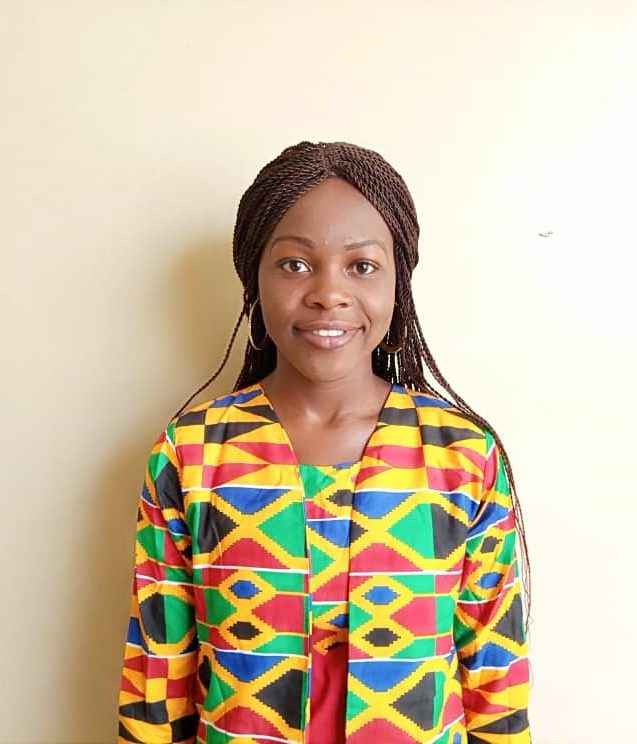
Ms. Rita Bonwi NJABEH — Cameroon
University for Development Studies, Tamale, Ghana
Ms. Rita Bonwi NJABEH is working towards her M.Phil. in Irrigation and Drainage Engineering at the University for Development Studies in Ghana. Her thesis title is “Effects of irrigation and nutrient uptake on different growth media in a greenhouse fertilizer experiment using cucumber as test crop.” Cameroon’s population is becoming more health conscious and the consumption of cucumbers and other fruits and vegetables is steadily increasing. To meet the demand in a resource-effective way, there is need for precision in cucumber cultivation. My research objective is to determine the growing media from agricultural waste that best suits a prescribed fertigation regime for optimal nutrient uptake and growth of plant and subsequently fruit yield. In the end, I will be able to determine the growth media most suitable for the uptake of water and nutrients, resulting in improved fertilizer recommendations. I will recommend the best yielding cucumber varieties with respect to the nutrient response in the optimal growing media for greenhouse farmers
My current interest is in applying my skills in the area of research and development in the agricultural sector and my future goals are geared towards community development. Upon completion of my research, I intend to work directly with farmers to introduce innovative, appropriate and adaptive technology. I intend to apply my skills in identifying, analysing and bringing solutions or mitigation to the problems plaguing the agricultural sector. I plan to be a practical engineer, becoming a supportive asset to farmers for promoting agriculture from a technical point of view. I also will treat farming as a business which will increase farmers income and raise rural livelihoods. I also have a to goal promote and inspire young girls to develop passion for agriculture and pursue it as their career.
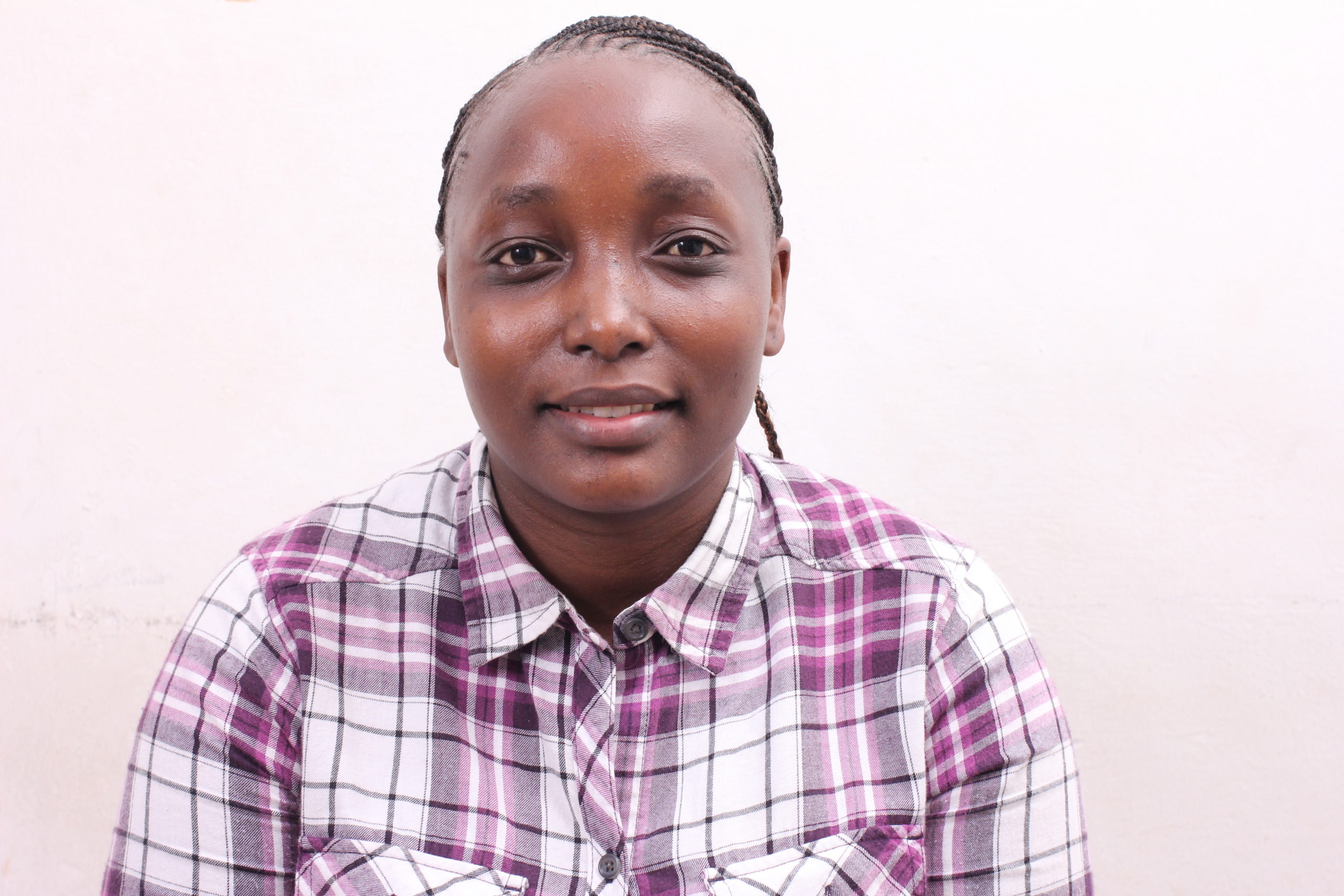
Ms. Winnie Ntinyari — Kenya
Department of Agricultural Science and Technology, Kenyatta University
Ms. Winnie Ntinyari is a Ph.D. student studying at the Department of Agricultural Science and Technology, Kenyatta University in Nairobi, Kenya. Her dissertation title is “Modelling nitrogen budgets, quantification of nitrous oxide and methane emission in maize-rice cropping systems under various management scenarios.”
Ms. Ntinyari’s research will estimate and model nitrogen budgets at different spatial scales, analyze nitrogen fertilizer management scenarios for improved nitrogen use efficiency, quantify nitrate leaching and nitrous oxide emissions in maize-rice cropping systems as major nitrogen loss fluxes influenced by fertilizer application. Nitrogen budgets will be essential in informing decision and policy makers on the need to shift focus towards the management of this essential nutrient. The N budget will also be modelled to provide projections of the future state of nitrogen use in farms and how it will impact crop productivity and food security. The best-case scenario for nitrogen fertilizer management will be put forward as a recommendation for farmers to improve nitrogen use efficiency in their farms, understanding the complete nitrogen cycle in agriculture system and achieving high crop yields.
My current research interests are to develop rational nutrient management scenarios for Africa through the development of nitrogen budgets at different spatial scales to guide farmers’ practices. My future career goals are to work in a competitive research environment at both local and international levels to contribute to improved and sustainable strategies for crop nutrient management and mitigation of greenhouse gases in agriculture. I hope to work with small-scale farmers in rural areas and equip them with technologies to prevent nutrient loss and maximize crop production. I also plan to join a professional body for networking and enhancing my scientific skill and open up future opportunities.
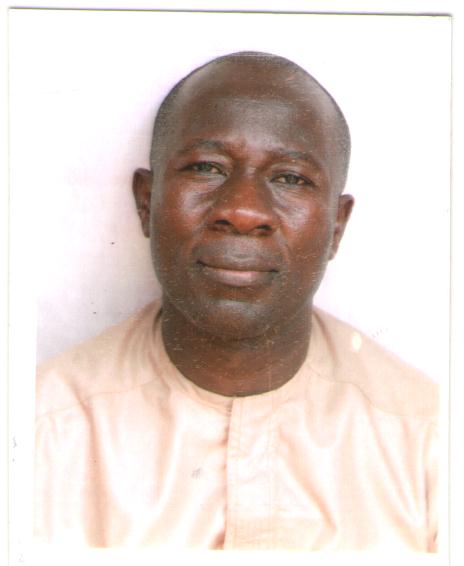
Mr. Monday USMAN — Nigeria
Department of Soil Science (Soil Fertility and Plant Nutrition), University of Agriculture, Makurdi-Nigeria.
My name is USMAN Monday, Department of Soil Science (Soil Fertility and Plant Nutrition), University of Agriculture, Makurdi-Nigeria. My thesis is titled: Response of sesame (Sesamum indicum L.) varieties to tillage and fertilizer in Southern Guinea and Sudan Savanna agro-ecological zones of Nigeria.
Research was undertaken with the objectives to assess the effect of tillage and fertilizer on soil physical and chemical properties in the ecological zones; to establish the appropriate tillage practice(s) that will be suitable for sesame production, and to determine the appropriate fertilizer practices that will be suitable for optimum production of sesame in these zones.
This research will help the sesame farmers in both zones to increase their annual production and income. The practical applications of expected outcomes will serve as a guide for optimum sesame production across the zones. Additionally, it is expected that this research work be presented in an international conference or published in a highly reputable journals.

